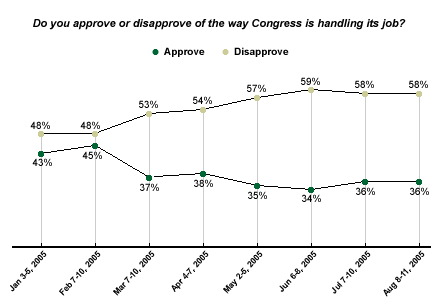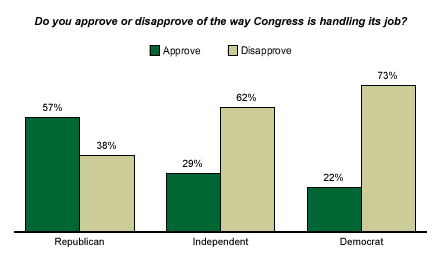As Congress returns to session this week, lawmakers have their work cut out for them. They must address the aftermath of Hurricane Katrina, rising oil prices, and a number of other foreign and domestic policy issues. A recent Gallup Poll* shows congressional leaders also have work to do in terms of public perceptions, as Americans' approval of how Congress is handling its job remains low.
According to the Aug. 8-11 poll, slightly more than a third (36%) of Americans approve of the way Congress is handling its job. A majority -- 58% -- disapprove. These most recent results are consistent with findings from July, continuing the recent trend of ratings in the mid-30% range.

Congress' approval ratings have not been below 40% for as many months since the spring and summer of 1997. However, the current ratings are still significantly higher than Congress' low points. In March 1992 only 18% approved, and in June 1979 only 19% approved.
Opinion Varies by Political Party, Age Group
Political party affiliation affects Americans' opinions of Congress. More than half of Republicans (57%) approve of the way the current GOP-controlled Congress is doing its job, compared with less than a third of independents (29%) and only 22% of Democrats.

Congressional approval also varies by age, although less than a majority of every age group gives Congress a positive appraisal. Forty-three percent of 18- to 29-year-olds approve of the way Congress is handling things, as do 41% of those between the ages of 30 and 49. But, job approval is lower among Americans aged 50 to 64, just 29% approve, and among those aged 65 and older, 26% approve. Gallup research has shown consistent age differences such as these in congressional job approval all the way back to the first measurement in 1974.
*These results are based on telephone interviews with a randomly selected national sample of 1,001 adults, aged 18 and older, conducted Aug. 8-11, 2005. For results based on this sample, one can say with 95% confidence that the maximum error attributable to sampling and other random effects is ±3 percentage points. In addition to sampling error, question wording and practical difficulties in conducting surveys can introduce error or bias into the findings of public opinion polls.
